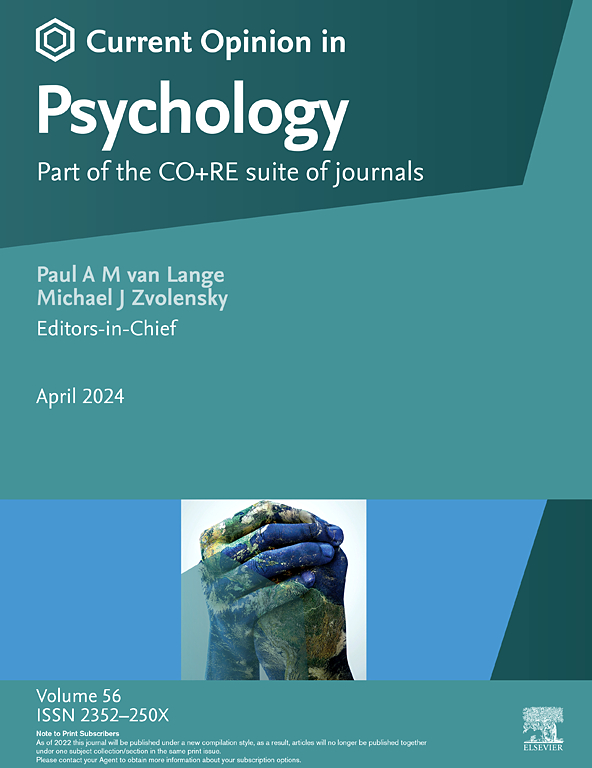From perception to projection: Exploring neuroaffective advances in understanding optimism bias and belief updating
IF 6.9
2区 心理学
Q1 PSYCHOLOGY, MULTIDISCIPLINARY
引用次数: 0
Abstract
Why do individuals tend to discount bad news when making judgements about the likelihood of future events? In this short review, we explore recent research findings regarding this frequently observed and replicated phenomenon – optimism bias – with particular attention on how this bias affects the way individuals update or revise their beliefs. We begin by highlighting five interrelated frameworks for understanding optimism bias (utility maximization, active inference, dual systems, cognitive immunity, predictive processing). We then examine findings from affective and clinical domains that indicate that people with depression and other psychiatric disorders, as well as acutely sad or anxious individuals, have dampened optimistic bias when updating beliefs in response to good news. Finally, we consider the neural underpinnings of these phenomena through the free energy principle and discuss implications for clinical interventions and future research.
从感知到预测:探索神经情感在理解乐观偏差和信念更新方面的进展。
为什么个体在对未来事件的可能性做出判断时倾向于忽略坏消息?在这篇简短的综述中,我们将探讨有关这种经常观察到并被重复的现象--乐观偏差--的最新研究成果,并特别关注这种偏差如何影响个人更新或修正其信念的方式。我们首先强调了理解乐观偏差的五个相互关联的框架(效用最大化、主动推断、双系统、认知免疫、预测处理)。然后,我们研究了情感和临床领域的研究结果,这些研究结果表明,抑郁症患者和其他精神疾病患者,以及极度悲伤或焦虑的人,在听到好消息时更新信念的乐观偏差会受到抑制。最后,我们通过自由能原理考虑了这些现象的神经基础,并讨论了对临床干预和未来研究的影响。
本文章由计算机程序翻译,如有差异,请以英文原文为准。
求助全文
约1分钟内获得全文
求助全文
来源期刊

Current Opinion in Psychology
PSYCHOLOGY, MULTIDISCIPLINARY-
CiteScore
12.10
自引率
3.40%
发文量
293
审稿时长
53 days
期刊介绍:
Current Opinion in Psychology is part of the Current Opinion and Research (CO+RE) suite of journals and is a companion to the primary research, open access journal, Current Research in Ecological and Social Psychology. CO+RE journals leverage the Current Opinion legacy of editorial excellence, high-impact, and global reach to ensure they are a widely-read resource that is integral to scientists' workflows.
Current Opinion in Psychology is divided into themed sections, some of which may be reviewed on an annual basis if appropriate. The amount of space devoted to each section is related to its importance. The topics covered will include:
* Biological psychology
* Clinical psychology
* Cognitive psychology
* Community psychology
* Comparative psychology
* Developmental psychology
* Educational psychology
* Environmental psychology
* Evolutionary psychology
* Health psychology
* Neuropsychology
* Personality psychology
* Social psychology
 求助内容:
求助内容: 应助结果提醒方式:
应助结果提醒方式:


